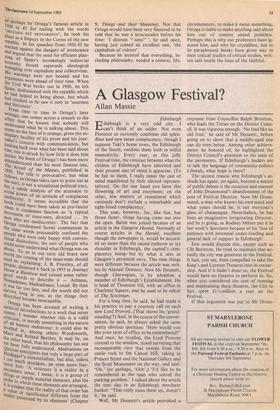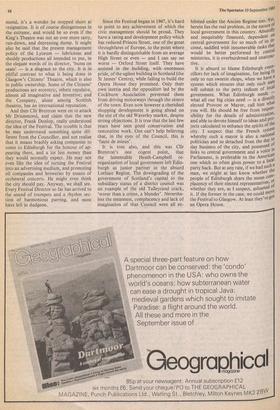A Glasgow Festival?
Allan Massie
Edinburgh dinburgh is a very odd city. I can't think of an odder. Not even Florence so curiously combines old splen- dour and new mean complacency, though I suppose Taki's home town, the Edinburgh of the South, outdoes them both in wilful insensitivity. Every year, at this jolly Festival time, the contrast between what the citizens of Edinburgh have inherited and their present cast of mind is apparent. (To be fair to them, I really mean the cast of mind manifested by their elected represen- tatives). On the one hand you have this flowering of art and enoyment; on the other, low mutters of resentment which curiously don't exclude a remarkable and tight-fisted complacency.
This year, however, fur, like fun, has flown faster, things having come out into the open. Battle was joined because of an article in the Glasgow Herald. Normally of course articles in the Herald, excellent though the newspaper is, would be accord- ed no more than the raised eyebrow or icy shoulder in Edinburgh, the capital's com- placency being- fed by what it sees as Glasgow's persistent envy. This time things were different because the article was writ- ten by Alastair Dunnett. Now Mr Dunnett, though Glaswegian, is by adoption a member of Edinburgh's Establishment. He is head of Thomson Oil, with an office in Charlotte Square, and he used to be editor of The Scotsman.
For a long time, he said, he had made it his practice to pay a courtesy call on each new Lord Provost. (That shows his 'grand- standing'!) And, in the course of the conver- sation, he said, he always asked the same pretty obvious question: 'How would you like your term of office to be remembered?' And once, he recalled, the Lord Provost crossed to the window, stood surveying that incomparable view that sweeps from the castle rock to the Calton Hill, taking in Princes Street and the National Gallery and the Scott Monument on the way, and said: 'Oh,' (or perhaps, 'Och',) 'I'd like to be remembered as the man who solved the parking problem.' I talked about the article the next day to an Edinburgh merchant banker: 'That reply sums them up, doesn't it,' he said.
Well, Mr Dunnett's article provoked a response from Councillor Ralph Brereton, who leads the Tories on the District Coun- cil. It was vigorous enough. `No fool like an old fool,' he said of Mr Dunnett, before going on to show that a middle-aged one can do even better. Among other achieve- ments he boasted of, he highlighted the District Council's attention to the state of the pavements. If Edinburgh's leaders are to talk the language of community-politics Liberals, what hope is there?
The second reason why Edinburgh's at- titude has again, yet again, become a matter of public debate is the occasion and manner of John Drummond's abandonment of the post of Festival Director. Now Mr Drum- mond, a man who knows his own mind and what yours should be, is not everyone's glass of champagne. Nevertheless, he has been an imaginative invigorating Director, and he is going, as Rodney Milnes put it in last week's Spectator because of his 'loss of patience with perennial under-funding and general lack of support in Edinburgh'.
Few would dispute this, except such as Cllr Brereton. He tried to maintain that ac- tually the city was generous to the Festival. It had, you see, been compelled to take the King's and Lyceum Theatres into its owner- ship. And if it hadn't done so, the Festival would have no theatres to perform in. So, when you considered the cost of running and maintaining these theatres, the City in fact spent Ll 1/2 million a year on the Festival.
If that argument was put to Mr Drum- mond, it's a wonder he stopped short at resignation. It is of course disingenuous in the extreme, and would be so even if the King's Theatre was not an ever more tatty, run-down, and depressing dump. It might also be said that the present management policy of the Lyceum — lubricious and shoddy productions all intended to put, in the elegant words of its director, 'bums on seats' — is a disgrace to the city. It is in pitiful contrast to what is being done in Glasgow's Citizens' Theatre, which is also in public ownership. Some of the Citizens' productions are eccentric, others repulsive, almost all imaginative and inventive; and the Company, alone among Scottish theatres, has an international reputation.
And then Cllr Brereton went on to attack Mr Drummond, and claim that the new director, Frank Dunlop, really understood the idea of the Festival. The trouble is that he may understand something quite dif- ferent from the Councillor, and not realise that it means brashly asking companies to come to Edinburgh for the honour of ap- pearing there, and a lot less money than they would normally expect. He may not even like the idea of turning the Festival into an advertising medium, and promoting oil companies and breweries by means of orchestral concerts. He might even think the city should pay. Anyway, we shall see. Every Festival Director so far has arrived to the sound of trumpets and a rhythm sec- tion of harmonious purring, and most have left in dudgeon. Since the Festival began in 1947, it's hard to point to any achievement of which the civic management should be proud. They have a rating and development policy which has reduced Princes Street, one of the great throughfares of Europe, to the point where it is hardly distinguishable from an average High Street or even — and I can say no worse — Oxford Street itself. They have assisted in the building, with enormous pride, of the ugliest building in Scotland (the St James' Centre), while failing to build the Opera House they promised. Only their own inertia and the opposition led by the Cockburn Association prevented them from driving motorways through the centre of the town. Even now however a cherished shopping development is going ahead on the site of the old Waverley market, despite strong objections. It is true that the last few years have seen good conservation and restoration work. One can't help believing that, in the eyes of the Council, this is `faute de mieux'.
It is true also, and this was CIlr Brereton's one cogent point, that the lamentable Heath-Campbell re- organization of local government left Edin- burgh as junior partner in the absurd Lothian Region. The downgrading of the government of Scotland's capital to the subsidiary status of a district council was an example of the old Talleyrand crack, 'worse than a crime, a blunder'. Neverthe- less the meanness, complacency and lack of imagination of that Council were all ex-
hibited under the Ancien Regime too. yet, herein lies the real problem, in the nature of local government in this country. AbsurcllY and inequitably financed, dependent on central government for so much of its 111- come, saddled with innumerable tasks that would be better performed by central ministries, it is overburdened and unattrac- tive.
It is absurd to blame Edinburgh coun. cillors for lack of imagination, for, being fit only to run sweetie shops, when we have 8 system which ensures that only such men, will submit to the petty tedium of loco' government. What Edinburgh needs what all our big cities need — is a direct Provost or Mayor, call him what you will. He should be free from 'respoll" sibility for the details of administration, and able to devote himself to ideas and 10" jects calculated to enhance the spirits of the city. I suspect that the French systell whereby such a mayor is also a nationa politician and so detached from the day day business of the city, and possessed 0.1 links to central government and a voice 111 Parliament, is preferable to the American, one which so often gives power to a local party hack. But at any rate, if we had such a man, we might at last know whether the people of Edinburgh share the mean com- placency of their elected representatives, 01; whether they are, as I suspect, ashamed 01 it. If the former in the case, we could 1110e the Festival to Glasgow. At least they've gc4 an Opera House.







































 Previous page
Previous page